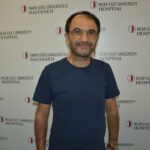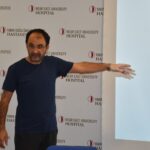
The “Climate Change, Nature, and Humanity” seminar held at Near East University addressed the impacts of the climate crisis on nature and human life, drawing on scientific data.
The “Climate Change, Nature, and Humanity” seminar, held at Near East University to address the multidimensional impacts of climate change and the relationship between nature and humans, was carried out by the Department of Landscape Architecture, Faculty of Agriculture, Near East University.
The seminar, held at Near East University Hospital, aimed to evaluate the impacts of climate change, ranging from biodiversity to human life, in light of scientific data and to raise awareness on this issue.
Prof. Dr. Salih Gücel, Vice Dean of the Faculty of Agriculture and Faculty Member of the Department of Landscape Architecture, known for his work in the field of environment and ecology, was the speaker at the event. Prof. Dr. Salih Gücel’s presentation addressed the pressures of the climate crisis on natural life, the adaptation process of species to changing conditions, the significance of paleoclimate data for today, and the impact of human activities on nature. The event also presented concrete examples of the impacts of rising temperatures, extreme weather events, and environmental damage on quality of life.

Prof. Dr. Özge Özden: “Climate change must be a priority on the national agenda!”
In her opening remarks, Prof. Dr. Özge Özden, Dean of the Faculty of Agriculture and Head of the Landscape Architecture Department, emphasized that climate change is an issue that cannot be postponed. “Climate change is a multidimensional crisis that threatens not only the environment but also nature, social life, the economy, and human health.” Prof. Dr. Özden said, emphasizing the magnitude of the threat. Stating that the issue has not received the attention it deserves on the national agenda, Prof. Dr. Özden said, “Despite such a significant threat, climate change is not a top priority on the national agenda. However, it should be, because the longer it is delayed, the deeper its impact becomes.” Prof. Dr. Özden explained that this presentation was prepared to share scientific knowledge gained from international studies and projects. Özden said, “Science clearly tells us what we need to do; all that remains is the determination to implement it.”

Prof. Dr. Salih Gücel: “Sustainable planning and ecological awareness have become more critical than ever!”
In his presentation, Prof. Dr. Salih Gücel emphasized that climate change is not merely a meteorological problem, emphasizing that it is a multifaceted crisis that directly impacts human life and ecosystems. Reminding that atmospheric dynamics such as temperature, humidity, wind, and precipitation are the fundamental determinants of the life cycle, Prof. Dr. Gücel emphasized the importance of studying climate history, saying, “To better foresee our future, we must correctly understand our past.”
In his presentation, Prof. Dr. Gücel also touched on the responses of plants to climate change, providing examples of the pressures that rising temperatures and dwindling water resources place on ecosystems. He explained that plants under water stress try to reduce water loss by closing their stomata. Gücel said, “When plants begin to use light respiration to meet their energy needs, this process creates a chain reaction that leads to oxygen poisoning and the plant’s death.” Prof. Dr. Gücel noted that this situation is particularly evident in maquis vegetation and elevation-dependent water relations.
Emphasizing that climate change directly impacts human life, Prof. Dr. Gücel stated that increasing urbanization, desertification, and vector-borne diseases could pose a greater threat in the future. Prof. Dr. Gücel said, “Climate change has both direct and indirect impacts. It is reshaping every aspect, from biodiversity loss to health, from urbanization to water security.”, and emphasized that sustainable planning and ecological awareness have become more critical than ever. Prof. Dr. Salih Gücel noted that rising temperatures have a wide-ranging impact, from agricultural production to natural vegetation, and that extreme weather events have resulted in fish kills, an increase in marine invasive species, and a tendency toward desertification in recent years. Prof. Dr. Prof. Gücel also said, “This process not only affects ecosystems but also directly affects human health, water security, and quality of life.” Prof. Dr. Gücel also gave examples of climate change research projects he is conducting in partnership with various universities and scientific research organizations in France, Italy, and Germany, emphasizing the importance of climate change for Cyprus.

